Loading AI tools
From Wikipedia, the free encyclopedia
Human spaceflights were vital to the operation of Mir, allowing crews and equipment to be carried to and from the space station. Mir was visited by a total of 39 crewed missions, comprising 30 Soyuz flights (1 Soyuz-T, 29 Soyuz-TM) and 9 Space Shuttle flights. These missions carried both long-duration crew members flying principal expeditions (ranging from 70 days up to Valeri Polyakov's 14-month stay beginning in January 1994, which still holds the record for the longest continuous spaceflight by a single person) and short-term visitors (who spent about a week aboard the station). Many of the crew who visited Mir used different spacecraft to launch than they did to land; the first such examples were Aleksandr Viktorenko and Muhammed Faris who flew up in Soyuz TM-3 (launched 22 July 1987) and landed a week later in Soyuz TM-2 on 30 July 1987. The largest crew aboard Mir simultaneously (not including Shuttle-Mir missions) was 6, which first occurred with the launch of Soyuz TM-7 on 26 November 1988 and lasted for just over three weeks.

Mir (Russian: Мир, IPA: [ˈmʲir]; lit. 'peace' or 'world') was a space station operated in low Earth orbit from 1986 to 2001, first by the Soviet Union and later by the Russian Federation. Mir was the first modular space station and was assembled in orbit from 1986 to 1996. It had a greater mass than any previous spacecraft. At the time it was the largest artificial satellite in orbit, succeeded by the International Space Station (ISS) after Mir's orbit decayed. The station served as a microgravity research laboratory in which crews conducted experiments in biology, human biology, physics, astronomy, meteorology, and spacecraft systems with a goal of developing technologies required for permanent occupation of space.
Following the success of the Salyut programme, Mir represented the next stage in the Soviet Union's space station programme. The first module of the station, known as the core module or base block, was launched in 1986 and followed by six further modules. Proton rockets were used to launch all of its components except for the docking module, which was installed by US Space Shuttle mission STS-74 in 1995. When complete, the station consisted of seven pressurised modules and several unpressurised components. Power was provided by several photovoltaic arrays attached directly to the modules. The station was maintained at an orbit between 296 km (184 mi) and 421 km (262 mi) altitude and travelled at an average speed of 27,700 km/h (17,200 mph), completing 15.7 orbits per day.[1][page needed][2][page needed][3]In this list, uncrewed visiting spacecraft are excluded (see List of uncrewed spaceflights to Mir for details), and long-duration crew members are listed in bold. Times are given in Coordinated Universal Time (UTC). "Time docked" refers to the spacecraft and does not necessarily correspond to the crew.
| # | Mission | Launch date (UTC) | Time docked | Landing date (UTC) | Launch crew | Crew photo | Crew patch | Notes |
|---|---|---|---|---|---|---|---|---|
| 1. | Soyuz T-15 | 13 March 1986 12:33:09 |
~52 days ~20 days |
16 July 1986 12:34:05 |
 |
Delivered the first crew, flying expedition EO-1, to Mir, then undocked, flew to and docked with Salyut 7 before returning to Mir. Remains the only spacecraft to have visited two space stations during one mission.[4][5] | ||
| 2. | Soyuz TM-2 | 5 February 1987 21:38:16 |
~172 days | 30 July 1987 01:04:12 |
 |
Delivered the second crew, flying expedition EO-2, to Mir.[4][5] | ||
| 3. | Soyuz TM-3 | 22 July 1987 01:59:17 |
~158 days | 29 December 1987 09:16:15 |
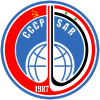 |
Delivered a third crew member, Aleksandrov, for EO-2, as well as the first Mir Intercosmos mission, EP-1, to the station. The EP-1 crew members, Viktorenko and Faris, returned to Earth aboard Soyuz TM-2 after 8 days.[4][5] | ||
| 4. | Soyuz TM-4 | 21 December 1987 11:18:03 |
~177 days | 17 June 1988 10:12:32 |
 |
Delivered the third expedition crew, EO-3, to Mir, in addition to Anatoli Levchenko, who returned to Earth aboard Soyuz TM-3 with the returning EO-2 crewmembers after 8 days.[4][5] | ||
| 5. | Soyuz TM-5 | 7 June 1988 14:03:13 |
~90 days | 7 September 1988 00:49:38 |
 |
Delivered the second Mir Intercosmos mission, EP-2, to the station. All three crew returned to Earth aboard Soyuz TM-4 after 10 days.[4][5] | ||
| 6. | Soyuz TM-6 | 29 August 1988 04:23:11 |
~112 days | 21 December 1988 09:57:00 |
 |
Delivered a third crew member, Polyakov, for EO-3, in addition to the third Mir Intercosmos crew, EP-3, who returned to Earth aboard Soyuz TM-5 after 9 days.[4][5] | ||
| 7. | Soyuz TM-7 | 26 November 1988 15:49:34 |
~149 days | 27 April 1989 02:57:58 |
 |
Delivered the EO-4 and Aragatz crews to Mir, with Chrétien returning to Earth aboard Soyuz TM-6 after 25 days.[4][5] | ||
| 8. | Soyuz TM-8 | 5 September 1989 21:38:03 |
~165 days | 19 February 1990 04:36:18 |
 |
Delivered the EO-5 crew to Mir.[4][5] | ||
| 9. | Soyuz TM-9 | 11 February 1990 06:16:00 |
~177 days | 9 August 1990 07:33:57 |
 |
Delivered the EO-6 crew to Mir.[4][5] | ||
| 10. | Soyuz TM-10 | 1 August 1990 09:32:21 |
~129 days | 10 December 1990 06:08:12 |
 |
Delivered the EO-7 crew to Mir.[4][5] | ||
| 11. | Soyuz TM-11 | 1 December 1990 08:13:32 |
~173 days | 26 May 1991 10:04:13 |
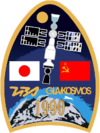 |
Delivered the EO-8 crew to Mir, in addition to the Japanese Kosmoreporter mission. Akiyama, who became the first Japanese citizen to fly in space, returned to Earth aboard Soyuz TM-10 after 8 days.[4][5] | ||
| 12. | Soyuz TM-12 | 18 May 1991 12:50:28 |
~142 days | 10 October 1991 04:12:18 |
 |
Delivered the EO-9 crew to Mir, in addition to the British Project Juno mission. Sharman, the first Briton to travel into space whilst not holding American citizenship, returned to Earth aboard Soyuz TM-11 after 8 days.[4][5] | ||
| 13. | Soyuz TM-13 | 2 October 1991 05:59:38 |
~173 days | 25 March 1992 08:51:22 |
 |
The last crewed spaceflight ever launched by the Soviet Union, Soyuz TM-13 delivered a third crew member to Mir for EO-10, in addition to carrying the first Austrian to go into space as part of the Austromir '91 mission. Aubakirov and Viehböck returned to Earth aboard Soyuz TMA-12 after 8 days.[4][5] | ||
| 14. | Soyuz TM-14 | 17 March 1992 10:54:30 |
~143 days | 10 August 1992 01:05:02 |
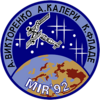 |
The first crewed spaceflight to be launched by the Russian Federation, Soyuz TM-14 delivered the EO-11 crew to Mir, in addition to Flade, flying the German Mir '92 mission, who returned to Earth aboard Soyuz TM-13 after 8 days.[4][5] | ||
| 15. | Soyuz TM-15 | 27 July 1992 06:08:42 |
~187 days | 1 February 1993 03:49:57 |
 |
Delivered the EO-12 crew to Mir, in addition to the French Antarès mission. Tognini returned to Earth aboard Soyuz TM-14 after 14 days.[4][5] | ||
| 16. | Soyuz TM-16 | 24 January 1993 05:58:05 |
~177 days | 22 July 1993 06:41:50 |
 |
Delivered the EO-13 crew to Mir. Became the only Soyuz spacecraft to dock at Kristall's distal APAS-89 port in order to check the port in preparation for the Shuttle-Mir flights which followed.[4][5] | ||
| 17. | Soyuz TM-17 | 1 July 1993 14:32:58 |
~195 days | 14 January 1994 08:18:20 |
 |
Delivered the EO-14 crew to Mir, in addition to the French Altair mission. Haigneré returned to Earth aboard Soyuz TM-16 after 21 days.[4][5] | ||
| 18. | Soyuz TM-18 | 8 January 1994 10:05:34 |
~180 days | 9 July 1994 10:32:35 |
 |
Delivered the EO-15 crew to Mir, with Polyakov remaining in space for over 437 days, the current world record for longest single spaceflight.[4][5] | ||
| 19. | Soyuz TM-19 | 1 July 1994 12:24:50 |
~124 days | 4 November 1994 11:18:26 |
 |
Delivered the EO-16 crew to Mir.[4][5] | ||
| 20. | Soyuz TM-20 | 3 October 1994 22:42:30 |
~166 days | 22 March 1995 04:04:05 |
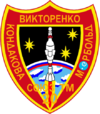 |
Delivered the EO-17 crew to Mir, in addition to the German Euromir '94 mission. Merbold returned to Earth aboard Soyuz TM-19 after 32 days.[4][5] | ||
| 21. | Soyuz TM-21 | 14 March 1995 06:11:34 |
~179 days | 11 September 1995 06:52:40 |
 |
 |
Delivered the EO-18 crew to Mir, including Thagard, flying the first US long-duration mission of the Shuttle-Mir programme. The entire crew returned to Earth aboard Space Shuttle Atlantis at the conclusion of STS-71.[4][5] | |
| 22. | STS-71 Atlantis |
27 June 1995 | 4 days, 22 hours |
|
 |
 |
Delivered Mir EO-19 crew Returned Mir EO-18 crew | |
| 23. | Soyuz TM-22 | 3 September 1995 09:00:23 |
~177 days | 29 February 1996 10:42:08 |
 |
Delivered the EO-20 crew to Mir, including the German Euromir '95 mission.[4][5] | ||
| 24. | STS-74 Atlantis |
12 November 1995 | 3 days, 2 hours |
|
 |
 |
Delivered Mir Docking Module & Solar Array Package | |
| 25. | Soyuz TM-23 | 21 February 1996 12:34:05 |
~192 days | 2 September 1996 07:41:40 |
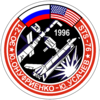 |
Delivered the EO-21 crew to Mir.[4][5] | ||
| 26. | STS-76 Atlantis |
22 March 1996 | 4 days, 23 hours |
|
 |
 |
Delivered Lucid for Mir EO-21 crew Deployed MEEP | |
| 27. | Soyuz TM-24 | 17 August 1996 13:18:03 |
~195 days | 2 March 1997 06:44:16 |
 |
Delivered the EO-21 crew to Mir. Haigneré returned to Earth aboard Soyuz TM-23 after 16 days.[4][5] | ||
| 28. | STS-79 Atlantis |
16 September 1996 | 4 days, 22 hours |
|
 |
 |
Delivered Blaha for Mir EO-22 crew | |
| 29. | STS-81 Atlantis |
12 January 1997 | 4 days, 22 hours |
|
 |
 |
Delivered Linenger for Mir EO-22 crew | |
| 30. | Soyuz TM-25 | 10 February 1997 14:09:30 |
~183 days | 14 August 1997 12:17:10 |
 |
Delivered the EO-23 crew to Mir. Ewald returned to Earth aboard Soyuz TM-24 after 20 days.[4][5] | ||
| 31. | STS-84 Atlantis |
15 May 1997 | 4 days, 23 hours |
|
 |
 |
Delivered Foale for Mir EO-23 crew | |
| 32. | Soyuz TM-26 | 5 August 1997 15:35:54 |
~196 days | 19 February 1998 09:10:30 |
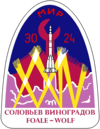 |
Delivered the EO-24 crew to Mir.[4][5] | ||
| 33. | STS-86 Atlantis |
27 September 1997 | 5 days, 22 hours |
|
 |
 |
Delivered Wolf for Mir EO-24 crew Retrieved MEEP | |
| 34. | STS-89 Endeavour |
22 January 1998 | 4 days, 21 hours |
|
 |
 |
Delivered Thomas for Mir EO-24 crew | |
| 35. | Soyuz TM-27 | 29 January 1998 16:33:42 |
~206 days | 25 August 1998 05:24:44 |
 |
Delivered the EO-25 crew to Mir. | ||
 |
Eyharts returned to Earth aboard Soyuz TM-26 after 22 days.[4][5] | |||||||
| 36. | STS-91 Discovery |
2 June 1998 | 3 days, 23 hours |
|
 |
 |
Returned Thomas from Mir EO-25 crew | |
| 37. | Soyuz TM-28 | 13 August 1998 09:43:11 |
~196 days | 28 February 1999 02:14:30 |
 |
Delivered the EO-26 crew to Mir. Baturin returned to Earth aboard Soyuz TM-27 after 12 days.[4][5] | ||
| 38. | Soyuz TM-29 | 20 February 1999 04:18:01 |
~186 days | 28 August 1999 00:34:20 |
 |
Delivered the EO-27 crew to Mir. Bella returned to Earth aboard Soyuz TM-28 after 8 days.[4][5] | ||
| 39. | Soyuz TM-30 | 4 April 2000 05:01:29 |
~70 days | 16 June 2000 00:44 |
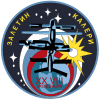 |
Final human spaceflight to Mir. Delivered the last crew, flying EO-28.[4][5] |
Seamless Wikipedia browsing. On steroids.
Every time you click a link to Wikipedia, Wiktionary or Wikiquote in your browser's search results, it will show the modern Wikiwand interface.
Wikiwand extension is a five stars, simple, with minimum permission required to keep your browsing private, safe and transparent.